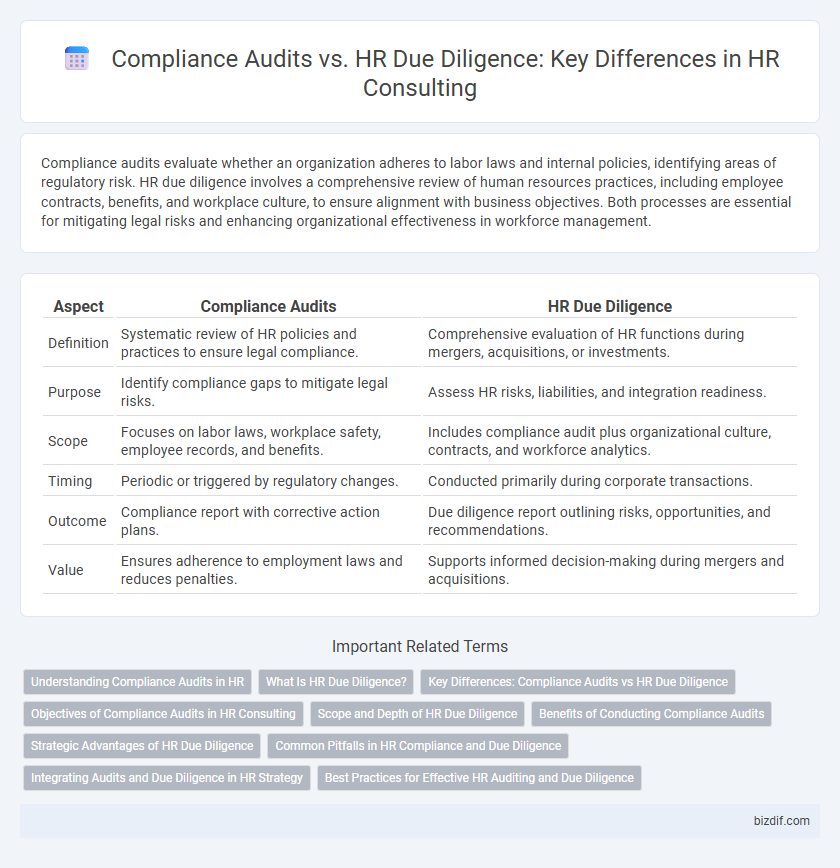Compliance audits evaluate whether an organization adheres to labor laws and internal policies, identifying areas of regulatory risk. HR due diligence involves a comprehensive review of human resources practices, including employee contracts, benefits, and workplace culture, to ensure alignment with business objectives. Both processes are essential for mitigating legal risks and enhancing organizational effectiveness in workforce management.
Table of Comparison
| Aspect | Compliance Audits | HR Due Diligence |
|---|---|---|
| Definition | Systematic review of HR policies and practices to ensure legal compliance. | Comprehensive evaluation of HR functions during mergers, acquisitions, or investments. |
| Purpose | Identify compliance gaps to mitigate legal risks. | Assess HR risks, liabilities, and integration readiness. |
| Scope | Focuses on labor laws, workplace safety, employee records, and benefits. | Includes compliance audit plus organizational culture, contracts, and workforce analytics. |
| Timing | Periodic or triggered by regulatory changes. | Conducted primarily during corporate transactions. |
| Outcome | Compliance report with corrective action plans. | Due diligence report outlining risks, opportunities, and recommendations. |
| Value | Ensures adherence to employment laws and reduces penalties. | Supports informed decision-making during mergers and acquisitions. |
Understanding Compliance Audits in HR
Compliance audits in HR systematically examine an organization's adherence to labor laws, regulations, and internal policies related to employment practices. These audits assess areas such as wage and hour compliance, employee classification, workplace safety, and anti-discrimination measures to identify potential legal risks. By conducting thorough compliance audits, HR departments can proactively address violations, reduce liability, and ensure alignment with evolving regulatory requirements.
What Is HR Due Diligence?
HR due diligence is a comprehensive evaluation process conducted during mergers, acquisitions, or organizational restructuring to assess workforce-related risks and compliance with employment laws. It involves analyzing employee contracts, benefits, workplace policies, labor relations, and potential liabilities to ensure alignment with legal standards and business goals. This proactive assessment helps identify hidden HR issues, streamline integration, and mitigate risks associated with talent management and regulatory compliance.
Key Differences: Compliance Audits vs HR Due Diligence
Compliance audits primarily assess adherence to labor laws, company policies, and regulatory requirements, identifying risks related to employment practices and workplace conditions. HR due diligence involves a comprehensive evaluation of human capital assets, organizational culture, and potential liabilities during mergers, acquisitions, or restructuring. Key differences include scope, purpose, and application: compliance audits focus on current legal conformity, while HR due diligence provides strategic insights into workforce integration and long-term organizational health.
Objectives of Compliance Audits in HR Consulting
Compliance audits in HR consulting aim to ensure that organizations adhere to labor laws, employment regulations, and internal policies to minimize legal risks and avoid penalties. These audits systematically review HR practices such as employee classification, wage and hour compliance, benefits administration, and workplace safety standards. By identifying non-compliance issues, compliance audits facilitate corrective actions that promote operational integrity and safeguard the company's reputation.
Scope and Depth of HR Due Diligence
Compliance audits primarily focus on verifying adherence to labor laws, regulations, and company policies through document reviews and checklist-based inspections. In contrast, HR due diligence offers a comprehensive assessment encompassing cultural fit, workforce capabilities, employee relations, and risk management strategies during mergers or acquisitions. The depth of HR due diligence extends beyond compliance to analyze organizational effectiveness, talent retention, and integration challenges, providing strategic insights for informed decision-making.
Benefits of Conducting Compliance Audits
Compliance audits in HR consulting provide critical benefits by systematically reviewing adherence to employment laws, reducing legal risks, and enhancing organizational accountability. These audits identify gaps in policies and practices, ensuring alignment with regulations such as FLSA, OSHA, and EEOC requirements. Conducting compliance audits helps companies avoid costly penalties, improve employee relations, and strengthen overall workforce management.
Strategic Advantages of HR Due Diligence
HR due diligence provides strategic advantages by identifying potential workforce risks, aligning talent capabilities with business goals, and uncovering opportunities for organizational growth, beyond the scope of standard compliance audits. It enables companies to make informed decisions during mergers, acquisitions, or reorganizations by assessing cultural fit, employee engagement, and leadership strengths. This proactive risk management supports long-term value creation and competitive advantage.
Common Pitfalls in HR Compliance and Due Diligence
Common pitfalls in HR compliance audits include overlooking state-specific employment laws, failing to document employee classifications accurately, and neglecting mandatory training records. In HR due diligence, inadequate assessment of employee contracts and benefits discrepancies often leads to post-transaction liabilities. Both processes require meticulous review of payroll data, workplace policies, and legal updates to mitigate risks effectively.
Integrating Audits and Due Diligence in HR Strategy
Integrating compliance audits with HR due diligence enhances organizational risk management by identifying and mitigating potential legal and operational issues in hiring, employee relations, and policy adherence. A cohesive HR strategy leverages audit findings and due diligence reports to streamline workforce planning, ensure regulatory compliance, and support informed decision-making in mergers, acquisitions, and ongoing talent management. This integration fosters a proactive approach to HR governance, aligning human capital practices with business objectives and maintaining ethical standards.
Best Practices for Effective HR Auditing and Due Diligence
Effective HR auditing and due diligence require a comprehensive review of employment policies, regulatory compliance, and risk management strategies to mitigate potential liabilities. Best practices include conducting regular compliance audits aligned with labor laws, detailed employee file assessments, and thorough verification of workforce documentation during HR due diligence processes. Leveraging data analytics and maintaining transparent communication with stakeholders enhances accuracy and supports proactive HR governance.
Compliance Audits vs HR Due Diligence Infographic

 bizdif.com
bizdif.com